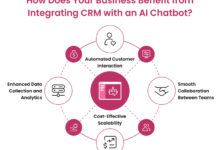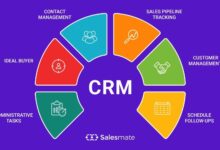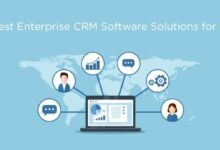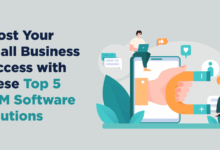AI-Powered CRM Software: Revolutionizing Customer Relations
AI-Powered CRM Software is transforming how businesses manage customer relationships. No longer are CRM systems just databases; they are intelligent platforms leveraging machine learning, predictive analytics, and natural language processing to automate tasks, personalize interactions, and drive significant improvements in sales, marketing, and customer service. This shift towards AI-driven CRM offers businesses unprecedented opportunities to understand their customers better, anticipate their needs, and ultimately, increase profitability and customer loyalty.
This exploration delves into the core functionalities of AI-powered CRM, examining its key advantages over traditional systems. We’ll explore real-world applications, discuss ethical considerations, and provide a roadmap for successful implementation and integration within your business. The future of customer relationship management is intelligent, and this overview will equip you with the knowledge to navigate this exciting landscape.
Defining AI-Powered CRM Software
AI-powered CRM software represents a significant advancement in customer relationship management, leveraging artificial intelligence to automate tasks, analyze data, and ultimately improve business outcomes. It moves beyond the capabilities of traditional CRM systems by incorporating machine learning and predictive analytics to provide more insightful and actionable information.
AI-powered CRM software goes beyond simple data storage and retrieval. It actively assists businesses in understanding customer behavior, predicting future trends, and personalizing interactions for improved customer satisfaction and increased sales. This leads to more efficient workflows and better decision-making across the entire organization.
Core Functionalities of AI-Powered CRM Software
AI-powered CRM systems offer a range of functionalities designed to streamline operations and enhance customer engagement. These functionalities are built upon the foundation of traditional CRM capabilities but significantly extend their power through the application of AI algorithms. Key functionalities include automated lead scoring and prioritization, predictive sales forecasting, personalized marketing campaigns, and proactive customer service through AI-powered chatbots. The integration of AI allows for more efficient resource allocation and improved overall productivity.
Key Differences Between Traditional and AI-Powered CRM Systems
Traditional CRM systems primarily focus on data organization and management. They allow businesses to store and access customer information, track interactions, and manage sales processes. However, they lack the analytical capabilities of AI-powered systems. AI-powered CRM systems, on the other hand, leverage machine learning algorithms to analyze vast amounts of data, identify patterns, and make predictions. This allows for more proactive and data-driven decision-making. For instance, a traditional CRM might simply track customer interactions, while an AI-powered system could predict which customers are most likely to churn and suggest proactive interventions.
Examples of AI Features Integrated into CRM Software
Several AI features are commonly integrated into modern CRM systems to enhance their capabilities. Predictive analytics utilizes historical data to forecast future outcomes, such as sales revenue or customer churn. Lead scoring automatically ranks leads based on their likelihood of conversion, allowing sales teams to prioritize their efforts. Chatbot integration provides instant customer support and answers frequently asked questions, freeing up human agents to handle more complex issues. These features significantly improve efficiency and effectiveness. For example, a predictive analytics model might identify a high-potential customer segment based on purchasing history and demographics, allowing for targeted marketing campaigns.
Comparison of Three AI-Powered CRM Solutions
| Feature | Salesforce Einstein | Microsoft Dynamics 365 AI | HubSpot CRM with AI features |
|---|---|---|---|
| Predictive Analytics | Strong, with various predictive models available. | Robust predictive capabilities integrated across modules. | Good predictive capabilities, particularly for lead scoring and sales forecasting. |
| Lead Scoring | Highly customizable and sophisticated lead scoring engine. | Provides automated lead scoring based on predefined criteria. | Intuitive and easy-to-use lead scoring system with good integration with other HubSpot tools. |
| Chatbot Integration | Offers integration with various chatbot platforms. | Provides built-in chatbot capabilities and integration with other Microsoft services. | Seamless integration with HubSpot’s conversational bots. |
| Strengths | Extensive features, strong integration with other Salesforce products. | Deep integration with the Microsoft ecosystem. | User-friendly interface, strong marketing automation capabilities. |
| Weaknesses | Can be complex and expensive to implement. | Requires significant technical expertise for full utilization. | Fewer advanced AI features compared to Salesforce and Microsoft. |
Benefits and Use Cases of AI-Powered CRM Software
AI is revolutionizing customer relationship management (CRM), transforming how businesses interact with their customers and manage their data. By automating tasks, analyzing vast datasets, and providing insightful predictions, AI-powered CRM systems offer significant advantages over traditional CRM approaches, leading to improved efficiency, increased sales, and enhanced customer satisfaction.
AI’s impact on customer relationship management is multifaceted. It streamlines processes, allowing sales and marketing teams to focus on strategic initiatives rather than repetitive tasks. The enhanced data analysis capabilities provide a clearer understanding of customer behavior, preferences, and needs, enabling more personalized and effective interactions. This leads to improved customer loyalty and increased revenue.
Improved Sales Efficiency and Lead Generation
AI significantly boosts sales efficiency and lead generation through several key functionalities. Predictive lead scoring, for instance, uses machine learning algorithms to analyze lead data and predict the likelihood of conversion. This allows sales teams to prioritize high-potential leads, optimizing their time and resources. AI-powered chatbots handle initial customer inquiries, qualify leads, and schedule appointments, freeing up sales representatives to focus on closing deals. Furthermore, AI-driven sales forecasting models analyze historical data and market trends to predict future sales performance, enabling businesses to make informed decisions about resource allocation and strategic planning. For example, a company selling SaaS software might use AI to identify leads most likely to convert based on factors like website engagement, job title, and company size, allowing sales reps to focus their efforts on those prospects.
Real-World Examples of AI-Powered CRM Success
Several businesses have successfully leveraged AI-powered CRM systems to achieve significant improvements. Salesforce Einstein, for example, uses AI to provide sales representatives with personalized insights and recommendations, helping them close more deals. Similarly, companies like HubSpot and Zoho utilize AI to automate tasks, improve lead scoring, and personalize customer interactions. A hypothetical example could be a large e-commerce retailer using AI to analyze customer purchase history and browsing behavior to identify potential upselling and cross-selling opportunities, leading to increased average order value. Another example could involve a financial institution utilizing AI to detect fraudulent transactions and prevent losses, thereby improving customer security and trust.
AI Enhancement of Customer Service Interactions
Imagine a customer contacting a company’s support team through a live chat. An AI-powered chatbot immediately engages, identifying the customer’s issue and providing relevant information or solutions. If the chatbot cannot resolve the issue, it seamlessly transfers the conversation to a human agent who already has access to the customer’s complete history and the context of the conversation. This immediate access to information allows the agent to resolve the issue quickly and efficiently, enhancing customer satisfaction. The AI system can also analyze customer interactions to identify common issues and areas for improvement in customer service processes. This results in more efficient and personalized support, ultimately improving customer loyalty and reducing support costs.
AI Features and Technologies in CRM
AI is rapidly transforming CRM systems, moving beyond basic data storage and retrieval to offer intelligent insights and automation. This enhancement significantly improves efficiency, customer experience, and overall business outcomes. The integration of various AI technologies allows for more personalized interactions, proactive support, and data-driven decision-making.
AI Algorithms in CRM Systems
Several AI algorithms power the intelligent features within modern CRM platforms. Machine learning (ML) algorithms, for example, analyze vast amounts of customer data to identify patterns and predict future behavior. This allows for personalized marketing campaigns and proactive customer service interventions. Natural Language Processing (NLP) enables the CRM to understand and respond to human language, facilitating chatbot interactions and sentiment analysis within customer communications. Deep learning, a subset of ML, allows for even more complex pattern recognition and prediction, leading to more accurate forecasting and improved customer segmentation.
Predictive Analytics for Sales Forecasting and Customer Segmentation
Predictive analytics, powered by machine learning algorithms, plays a crucial role in enhancing sales forecasting and customer segmentation. By analyzing historical data such as sales figures, customer demographics, and past interactions, predictive models can forecast future sales with greater accuracy. For example, a CRM system might predict which leads are most likely to convert into paying customers, allowing sales teams to prioritize their efforts effectively. Similarly, predictive analytics can segment customers based on their purchasing behavior, preferences, and predicted lifetime value, enabling targeted marketing campaigns and personalized offers. This leads to improved customer engagement and higher conversion rates. A company might identify a segment of high-value customers who are at risk of churning and proactively offer them retention incentives.
AI-Powered Chatbots for Customer Support and Engagement
AI-powered chatbots are revolutionizing customer support by providing instant, 24/7 assistance. These chatbots leverage NLP to understand customer queries and provide relevant responses, often resolving simple issues without human intervention. This frees up human agents to focus on more complex problems, improving overall customer service efficiency. Furthermore, chatbots can gather valuable customer data during interactions, providing insights into customer preferences and pain points. For example, a chatbot on an e-commerce website can guide customers through the purchasing process, answer product-related questions, and even handle returns and refunds. This leads to increased customer satisfaction and brand loyalty.
Ethical Considerations of AI in CRM
The use of AI in CRM raises several ethical considerations that require careful attention. Data privacy is paramount; ensuring customer data is collected, used, and stored ethically and in compliance with relevant regulations (like GDPR and CCPA) is crucial. Algorithmic bias is another significant concern; algorithms trained on biased data can perpetuate and amplify existing inequalities. Transparency is key; customers should be informed about how AI is being used to process their data. Accountability for AI-driven decisions is also essential; clear lines of responsibility must be established to address any potential negative consequences. Finally, the potential for job displacement due to automation needs careful consideration, with strategies for retraining and reskilling employees impacted by AI-driven changes.
Implementation and Integration of AI-Powered CRM
Implementing an AI-powered CRM system requires a strategic approach that considers various factors, from data preparation to employee training. A successful implementation hinges on careful planning, effective execution, and ongoing monitoring. The process involves a series of steps to ensure seamless integration and maximum return on investment.
Steps Involved in Implementing an AI-Powered CRM System
The implementation of an AI-powered CRM system is a multi-stage process. Each stage builds upon the previous one, ensuring a smooth transition and optimal functionality. Ignoring any of these steps could lead to integration issues and reduced effectiveness.
- Needs Assessment and Planning: Define specific business goals and identify areas where AI can improve efficiency and productivity. This includes evaluating existing CRM systems, data quality, and employee skills.
- Data Preparation and Migration: Cleanse and prepare existing CRM data for AI processing. This involves handling missing values, correcting inconsistencies, and ensuring data quality. Data migration from legacy systems needs careful planning to avoid data loss or corruption.
- AI-Powered CRM Selection and Configuration: Choose a CRM system that aligns with business needs and integrates seamlessly with existing systems. Configure the system to meet specific requirements, including customizing AI features and workflows.
- System Integration: Integrate the AI-powered CRM with existing business systems, such as marketing automation, sales platforms, and customer support tools. This ensures data consistency and efficient information flow.
- Testing and Deployment: Thoroughly test the system to identify and resolve any issues before full deployment. A phased rollout approach can minimize disruption and allow for iterative improvements.
- Monitoring and Optimization: Continuously monitor system performance and user feedback to identify areas for improvement. Regularly update and optimize the AI models to ensure accuracy and effectiveness.
Factors to Consider When Choosing an AI-Powered CRM Solution
Selecting the right AI-powered CRM is crucial for successful implementation. Several key factors must be considered to ensure the chosen solution meets the organization’s specific needs and objectives. A poorly chosen system can lead to wasted resources and unmet expectations.
- Scalability and Flexibility: The system should be able to adapt to changing business needs and scale as the organization grows.
- Integration Capabilities: The system should integrate seamlessly with existing business systems to ensure data consistency and efficient workflows.
- AI Features and Capabilities: The system should offer AI features that directly address specific business needs, such as lead scoring, predictive analytics, and customer segmentation.
- Data Security and Privacy: The system should comply with relevant data security and privacy regulations to protect sensitive customer information.
- Vendor Support and Training: The vendor should provide adequate support and training to ensure successful implementation and ongoing use of the system.
- Cost and ROI: The total cost of ownership, including implementation, maintenance, and training, should be carefully evaluated against the potential return on investment.
Best Practices for Integrating AI-Powered CRM with Existing Business Systems
Successful integration of AI-powered CRM requires a structured approach that considers data mapping, API usage, and data synchronization. This ensures data consistency and prevents data silos. Poor integration can lead to duplicated efforts and inaccurate data.
Prioritize data standardization to ensure consistent data formats across all integrated systems. Utilize APIs for seamless data exchange between the CRM and other systems. Implement robust data synchronization mechanisms to maintain data consistency in real-time. Regularly monitor data integrity and address any inconsistencies promptly.
Step-by-Step Guide for Training Employees on Using New AI Features Within the CRM
Effective employee training is critical for maximizing the benefits of AI-powered CRM features. A well-structured training program ensures employees understand and utilize the new tools effectively. Lack of training can lead to low adoption rates and reduced productivity.
- Needs Assessment: Identify specific training needs based on employee roles and responsibilities.
- Curriculum Development: Create a comprehensive training program that covers all aspects of the new AI features.
- Training Delivery: Use a variety of training methods, such as online modules, workshops, and on-the-job training.
- Hands-on Practice: Provide ample opportunities for employees to practice using the new AI features in a simulated or real-world environment.
- Ongoing Support: Offer ongoing support and resources to help employees continue to learn and improve their skills.
- Feedback and Evaluation: Regularly collect feedback from employees to assess the effectiveness of the training program and make necessary adjustments.
Future Trends in AI-Powered CRM
The landscape of AI-powered CRM is constantly evolving, driven by advancements in machine learning, natural language processing, and other related technologies. We can expect significant shifts in functionality, integration, and overall impact on businesses in the coming years. This section explores these potential future developments, highlighting the role of emerging technologies and addressing potential challenges.
The next generation of AI-powered CRM systems will likely be characterized by hyper-personalization, predictive analytics with greater accuracy, and seamless integration across various business functions. This will lead to more proactive and efficient customer engagement, improved operational efficiency, and ultimately, a stronger competitive advantage for businesses.
Enhanced Predictive Capabilities
AI algorithms will become increasingly sophisticated in predicting customer behavior, enabling businesses to anticipate needs and proactively address potential issues. This goes beyond simple churn prediction; future systems may predict optimal product recommendations, anticipate service requests, and even forecast future revenue streams with a higher degree of accuracy. For example, a retail company might use AI to predict which customers are likely to abandon their online shopping carts and send them targeted discount offers or personalized reminders. This proactive approach significantly improves conversion rates.
The Rise of Conversational AI and Automation
Expect a surge in the adoption of advanced conversational AI, powered by natural language processing (NLP) and machine learning. This will manifest in more human-like chatbots capable of handling complex customer queries, providing personalized support, and automating routine tasks like scheduling appointments or processing orders. For instance, an insurance company could deploy a chatbot that understands complex policy questions and can instantly provide accurate information, reducing the workload on human agents and improving customer satisfaction. The automation will extend beyond chatbots, encompassing tasks such as lead scoring, email marketing campaign optimization, and sales forecasting.
Blockchain Integration for Enhanced Security and Transparency
The integration of blockchain technology holds the potential to revolutionize data security and transparency within CRM systems. Blockchain’s decentralized and immutable nature can protect sensitive customer data from breaches and unauthorized access. It can also enhance trust and transparency by providing a verifiable audit trail of customer interactions and data modifications. Imagine a scenario where customer data is stored on a blockchain, ensuring its integrity and providing customers with greater control over their information. This would not only enhance security but also foster greater customer trust and loyalty.
IoT Integration for Contextualized Customer Interactions
The Internet of Things (IoT) is poised to significantly enhance the capabilities of AI-powered CRM. By integrating data from connected devices, businesses can gain a deeper understanding of customer behavior and preferences in real-time. For example, a smart home appliance manufacturer could leverage data from connected devices to identify potential maintenance needs and proactively offer service appointments, enhancing customer satisfaction and loyalty. This contextualized data enables more personalized and proactive customer interactions.
Challenges and Limitations of AI-Powered CRM
Despite the significant potential, challenges remain. Data privacy and security concerns are paramount. The ethical implications of using AI to influence customer behavior need careful consideration. Ensuring data quality and accuracy is crucial for reliable AI predictions. Furthermore, the high initial investment costs and the need for specialized expertise can be barriers to entry for some businesses. Finally, the potential for bias in AI algorithms needs to be addressed proactively to prevent discriminatory outcomes.
Impact on Job Roles in CRM Departments
The integration of AI will undoubtedly transform job roles within customer relationship management departments. While some routine tasks will be automated, this will free up human employees to focus on higher-value activities such as strategic planning, complex problem-solving, and building stronger customer relationships. The demand for professionals with skills in AI, data analytics, and customer experience management will likely increase, while the need for employees performing repetitive tasks may decrease. Reskilling and upskilling initiatives will be essential to adapt to this evolving landscape. For example, sales representatives might focus on closing complex deals and building relationships, while AI handles lead qualification and follow-up.
Illustrative Examples
AI-powered CRM systems are transforming how businesses interact with their customers, leading to significant improvements in efficiency and profitability. The following examples demonstrate the tangible impact of AI across various CRM functions.
AI-Powered Lead Scoring Improves Sales Conversion Rates
AI-powered lead scoring automates the process of ranking leads based on their likelihood of conversion. This is achieved by analyzing various data points, such as website activity, email engagement, and demographics, to assign a numerical score to each lead. Higher scores indicate a greater probability of conversion. For example, a company selling enterprise software might assign higher scores to leads who have downloaded white papers on their specific industry, attended webinars, and requested product demos. Conversely, leads with minimal engagement receive lower scores. This allows sales teams to prioritize their efforts on high-potential leads, increasing their efficiency and improving conversion rates. A study by Aberdeen Group found that companies using lead scoring see a 10-15% increase in sales conversion rates. Imagine a scenario where a sales team of 10 previously handled 100 leads per month, converting 10%. With AI-powered lead scoring, they prioritize 50 high-scoring leads, potentially converting 25 (a 250% increase in conversion from that subset), while the other 50 are managed more efficiently through automated nurture sequences.
AI-Driven Customer Segmentation Leads to Personalized Marketing Campaigns
AI enables the creation of highly granular customer segments based on complex behavioral and demographic data. This allows businesses to tailor their marketing messages and offers to specific customer groups, resulting in increased engagement and conversions. For instance, an e-commerce company could segment its customers based on purchase history, browsing behavior, and demographics. Customers who frequently purchase athletic wear might receive personalized email campaigns featuring new product releases and exclusive discounts on running shoes, while customers interested in home goods might receive targeted ads for new furniture collections. This personalized approach increases the relevance of marketing messages, improving click-through rates, conversion rates, and ultimately, customer lifetime value. A well-executed personalized campaign can lead to a 10-20% increase in sales and a significant boost in customer retention rates. For example, a hypothetical company saw a 15% increase in conversion rates for their personalized email campaigns compared to generic ones, resulting in a substantial revenue increase.
Visual Representation of an AI-Enhanced Customer Journey
Imagine a visual representation of a customer journey mapped across a timeline. At the initial stage (Awareness), AI-powered chatbots on the company website engage potential customers, qualifying them through initial interactions and directing them to relevant resources. The next stage (Consideration) involves personalized email marketing based on AI-driven lead scoring and segmentation, providing targeted content and offers. In the Decision stage, AI-powered sales tools provide sales representatives with insights into customer preferences and purchase history, enabling them to tailor their sales pitches effectively. Finally, in the Loyalty stage, AI-powered recommendation engines suggest relevant products or services based on past purchases and browsing history, fostering repeat business and customer retention. Throughout the journey, AI continuously analyzes customer interactions, providing valuable insights into customer behavior and preferences, allowing for ongoing optimization and improvement of the overall customer experience. This streamlined and personalized journey, facilitated by AI, results in higher customer satisfaction, increased conversion rates, and enhanced customer lifetime value.
Concluding Remarks
In conclusion, AI-powered CRM software represents a paradigm shift in customer relationship management, offering businesses powerful tools to optimize operations, enhance customer experiences, and drive revenue growth. By understanding the core functionalities, benefits, and potential challenges, organizations can effectively leverage AI to build stronger, more profitable customer relationships. The future of CRM is undeniably intelligent, and embracing this technology is key to staying competitive in today’s dynamic market.





